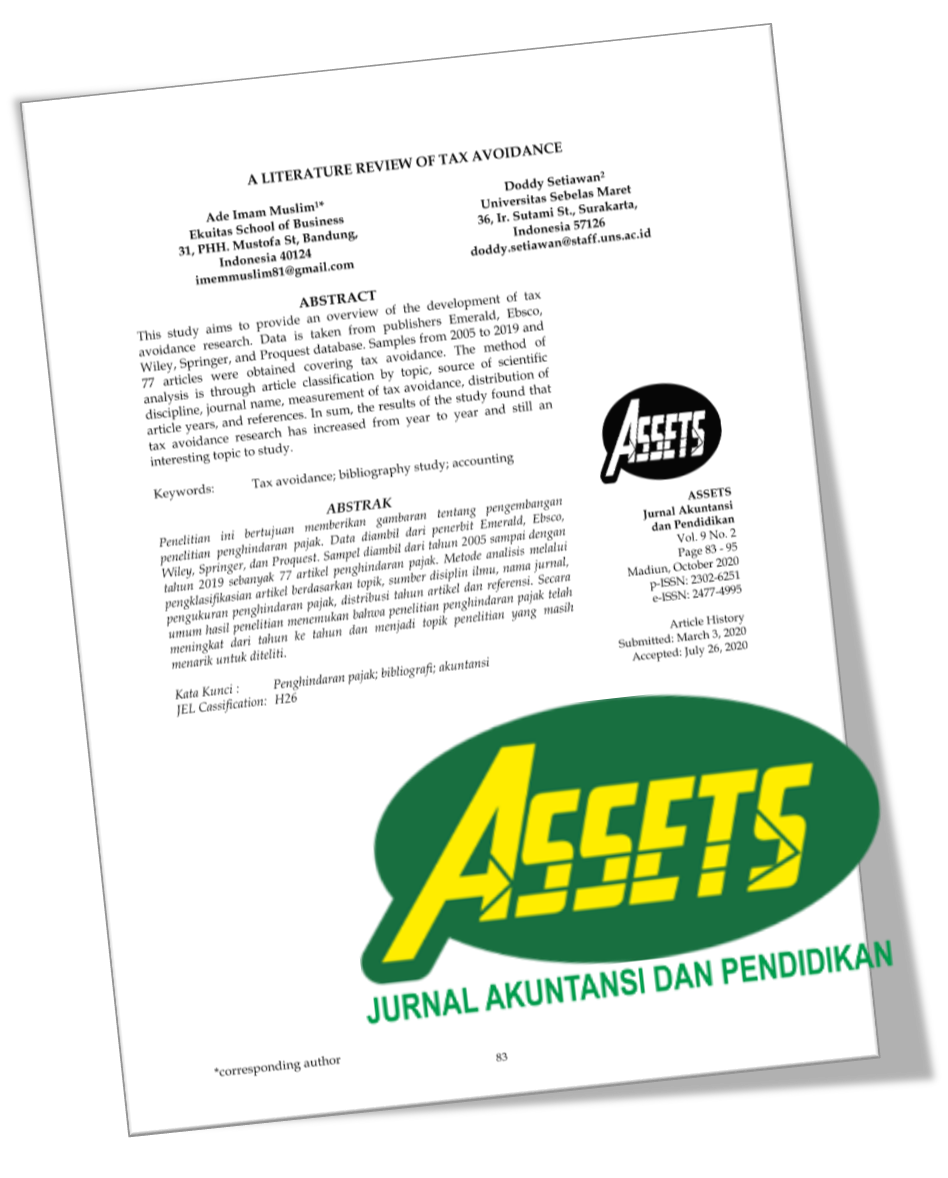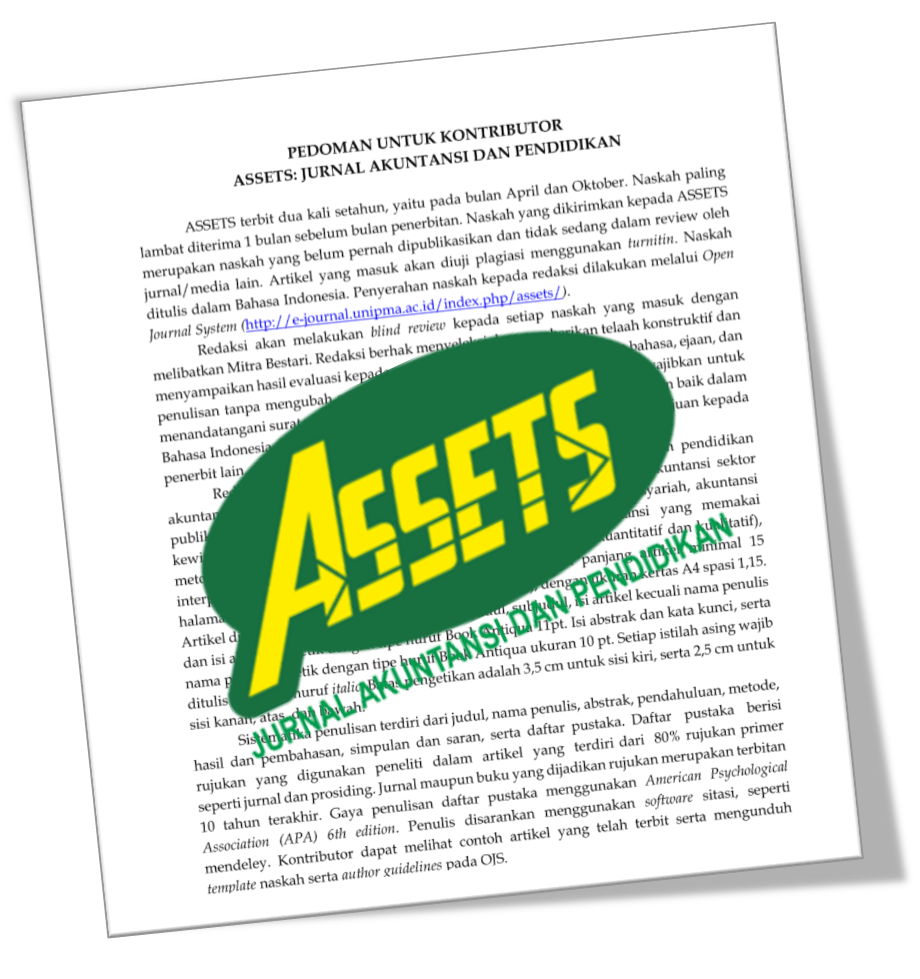MILITARY-CONNECTED BOARDS AND FINANCIAL DISTRESS RISK: THE MODERATING ROLE OF SUSTAINABILITY REPORT DISCLOSURE
DOI:
https://doi.org/10.25273/jap.v13i2.19787Keywords:
Financial Distress Risk, Legitimacy Theory, Military Connection, Rent Seeking Theory, Sustainability Report Disclosure, Risiko Kesulitan Keuangan, Teori Legitimasi, Koneksi Militer, Teori Rent-Seeking, Pengungkapan Laporan KeberlanjutanAbstract
ABSTRACT
This study utilizes rent-seeking and legitimacy theories to investigate the impact of military-connected boards and sustainability report disclosure on financial distress risk. This study's main subject is the non-financial public firms indexed by the Global Reporting Initiative (GRI) and listed on the Indonesia Stock Exchange (BEI) between 2017 and 2022. The findings show a strong positive correlation between the likelihood of financial distress and boards with ties to the military. Conversely, a lower risk of financial distress is significantly associated with higher disclosure in sustainability reports. Additionally, sustainability report disclosure mitigates the adverse effects of military-connected boards on financial distress risk. This study enhances existing knowledge by providing empirical evidence on how military connections and sustainability disclosures influence financial distress risk in a developing country context.
ABSTRAK
Studi ini menggunakan teori rent-seeking dan legitimasi untuk menyelidiki dampak dewan yang memiliki hubungan dengan militer dan pengungkapan laporan keberlanjutan terhadap risiko kesulitan keuangan. Subjek utama penelitian ini adalah perusahaan publik non-keuangan yang terindeks oleh Global Reporting Initiative (GRI) dan terdaftar di Bursa Efek Indonesia (BEI) antara tahun 2017 hingga 2022. Temuan menunjukkan adanya korelasi positif yang kuat antara kemungkinan terjadinya kesulitan keuangan dan dewan direksi terhubung militer. Sebaliknya, risiko kesulitan keuangan yang lebih rendah secara signifikan dikaitkan dengan pengungkapan yang lebih tinggi dalam laporan keberlanjutan. Selain itu, pengungkapan laporan keberlanjutan memitigasi dampak buruk dewan yang memiliki hubungan dengan militer terhadap risiko kesulitan keuangan. Studi ini meningkatkan pengetahuan yang ada dengan memberikan bukti empiris tentang bagaimana hubungan militer dan pengungkapan keberlanjutan mempengaruhi risiko kesulitan keuangan dalam konteks negara berkembang.
Downloads
References
Agarwal, V., & Taffler, R. (2008). Comparing the performance of market-based and accounting-based bankruptcy prediction models. Journal of Banking & Finance, 32(8), 1541-1551. https://doi.org/10.1016/j.jbankfin.2007.07.014
Agustia, D., Harymawan, I., & Permatasari, Y. (2022). Board Diversity, Sustainability Report Disclosure and Firm Value. Global Business Review, 23(6), 1520-1543. https://doi.org/10.1177/09721509221124125
Ali, S., Rehman, R. ur, Aslam, S., Khan, I., & Murtaza, G. (2023). Does board diversity reduce the likelihood of financial distress in the presence of a powerful Chinese CEO? Management Decision, 61(6), 1798-1815. https://doi.org/10.1108/MD-01-2022-0007
Altman, E. I. (1968). Financial ratios, discriminant analysis, and the prediction of corporate bankruptcy. The Journal of Finance, 23(4), 589-609. https://doi.org/10.2307/2978933
Altman, E. I., Iwanicz-Drozdowska, M., Laitinen, E. K., & Suvas, A. (2017). Financial Distress Prediction in an International Context: A Review and Empirical Analysis of Altman's Z-Score Model. Journal of International Financial Management & Accounting, 28(2), 131-171. https://doi.org/10.1111/jifm.12053
Anam Ashiq, Z. G. A. H. T. (2023). Moderating Role of Corporate Social Responsibility for the Effect of Managerial Ability on Financial Performance: Evidence from an Emerging Economy. Tuijin Jishu/Journal of Propulsion Technology, 44(5), 1671-1688. https://doi.org/10.52783/tjjpt.v44.i5.2842
Benmelech, E., & Frydman, C. (2015). Military CEOs. Journal of Financial Economics, 117(1), 43-59. https://doi.org/10.1016/j.jfineco.2014.04.009
Boubaker, S., Cellier, A., Manita, R., & Saeed, A. (2020). Does corporate social responsibility reduce financial distress risk? Economic Modelling, 91(September), 835-851. https://doi.org/10.1016/j.econmod.2020.05.012
Bryan, & Haryadi, E. (2018). Analisis pengaruh variabel moderasi switching costs terhadap hubungan service performance dan customer loyalty member celebrity fitness Jakarta. Jurnal Manajemen, 15(1), 52-71. https://doi.org/10.25170/jm.v15i1.98
Darrat, A. F., Gray, S., Park, J. C., & Wu, Y. (2016). Corporate Governance and Bankruptcy Risk. Journal of Accounting, Auditing & Finance, 31(2), 163-202. https://doi.org/10.1177/0148558X14560898
Farooq, M., Khan, I., Jabri, Q. Al, & Khan, M. T. (2024). Does corporate social responsibility mediate the relationship between board diversity and financial distress: evidence from an emerging economy? Corporate Governance: The International Journal of Business in Society, 24(2), 390-417. https://doi.org/10.1108/CG-05-2023-0210
Fitriani, N., Lusiano Firmansah, G., & Harymawan, I. (2022). Debt policy of military-connected firms in Indonesia. Investment Management and Financial Innovations, 19(3), 105-118. https://doi.org/10.21511/imfi.19(3).2022.10
García, C. J., & Herrero, B. (2021). Female directors, capital structure, and financial distress. Journal of Business Research, 136(November), 592-601. https://doi.org/10.1016/j.jbusres.2021.07.061
Guizani, M., & Abdalkrim, G. (2023). Does gender diversity on boards reduce the likelihood of financial distress? Evidence from Malaysia. Asia-Pacific Journal of Business Administration, 15(2), 287-306. https://doi.org/10.1108/APJBA-06-2021-0277
Hamad, H. A., & Cek, K. (2023). The Moderating Effects of Corporate Social Responsibility on Corporate Financial Performance: Evidence from OECD Countries. Sustainability, 15(8901), 1-20. https://doi.org/10.3390/su15118901
Hao, Y., Zhao, M., & Wei, Z. (2024). Can military executives overcome difficulties in corporate value creation? Evidence from China. China Economic Review, 84(102110), 1-29. https://doi.org/10.1016/j.chieco.2023.102110
Harymawan, I. (2018). Why do firms appoint former military personnel as directors? Evidence of loan interest rate in militarily connected firms in Indonesia. Asian Review of Accounting, 26(1), 2-18. https://doi.org/10.1108/ARA-07-2016-0086
Harymawan, I. (2020). Military reform, militarily-connected firms and auditor choice. Managerial Auditing Journal, 35(6), 705-729. https://doi.org/10.1108/MAJ-04-2019-2258
Harymawan, I., Putra, F. K. G., Rizki, A., & Nasih, M. (2022). Innovation intensity of military-connected firms. International Journal of Managerial Finance, 18(2), 365-397. https://doi.org/10.1108/IJMF-12-2020-0616
Harymawan, I., Wardani, D. A. K., & Nowland, J. (2023). Military directors and audit fees. Journal of Accounting in Emerging Economies, 14(3), 639-658. https://doi.org/10.1108/JAEE-06-2022-0158
IFC. (2018). Indonesia Corporate Governance Manual, Second Edition. Washington, DC. https://doi.org/10.1596/30122
Isayas, Y. N. (2021). Financial distress and its determinants: Evidence from insurance companies in Ethiopia. Cogent Business & Management, 8(1951110), 1-16. https://doi.org/10.1080/23311975.2021.1951110
Jiang, L., Cherian, J., Sial, M. S., Wan, P., Filipe, J. A., Mata, M. N., & Chen, X. (2021). The moderating role of CSR in board gender diversity and firm financial performance: empirical evidence from an emerging economy. Economic Research-Ekonomska Istraživanja, 34(1), 2354-2373. https://doi.org/10.1080/1331677X.2020.1863829
Koch-Bayram, I. F., & Wernicke, G. (2018). Drilled to obey? Ex-military CEOs and financial misconduct. Strategic Management Journal, 39(11), 2943-2964. https://doi.org/10.1002/smj.2946
Kuzey, C., Uyar, A., Wasiuzzaman, S., Karaman, A. S., & Inwinkl, P. (2023). Financial distress and corporate transparency/opacity: The role of firm visibility. International Review of Economics & Finance, 88(November), 766-798. https://doi.org/10.1016/j.iref.2023.07.019
Law, K. K. F., & Mills, L. F. (2017). Military experience and corporate tax avoidance. Review of Accounting Studies, 22(1), 141-184. https://doi.org/10.1007/s11142-016-9373-z
Leng, J., Ozkan, A., Ozkan, N., & Trzeciakiewicz, A. (2021). CEO overconfidence and the probability of corporate failure: evidence from the United Kingdom. The European Journal of Finance, 27(12), 1210-1234. https://doi.org/10.1080/1351847X.2021.1876131
Lin, L., Nguyen, N. H., Young, M., & Zou, L. (2021). Military executives and corporate outcomes: Evidence from China. Emerging Markets Review, 49 (100765), 1-19. https://doi.org/10.1016/j.ememar.2020.100765
Lu, J., Javeed, S. A., Latief, R., Jiang, T., & Ong, T. S. (2021). The Moderating Role of Corporate Social Responsibility in the Association of Internal Corporate Governance and Profitability; Evidence from Pakistan. International Journal of Environmental Research and Public Health, 18(5830), 1-22. https://doi.org/10.3390/ijerph18115830
Magnanelli, B. S., & Izzo, M. F. (2017). Corporate social performance and cost of debt: the relationship. Social Responsibility Journal, 13(2), 250-265. https://doi.org/10.1108/SRJ-06-2016-0103
Manzaneque, M., Priego, A. M., & Merino, E. (2016). Corporate governance effect on financial distress likelihood: Evidence from Spain. Revista de Contabilidad, 19(1), 111-121. https://doi.org/10.1016/j.rcsar.2015.04.001
Nasih, M., Anridho, N., Rahayu, N. K., & Nowland, J. (2022). CEO masculinity and CSR disclosure: evidence from Indonesia. Asian Journal of Accounting Research, 8(2), 157-169. https://doi.org/10.1108/AJAR-04-2022-0119
Otoritas Jasa Keuangan. (2017). Peraturan Otoritas Jasa Keuangan Nomor 51 /POJK.03/2017 Tentang Penerapan Keuangan Berkelanjutan Bagi Lembaga Jasa Keuangan, Emitten dan Perusahaan Publik. Otoritas Jasa Keuangan, 1-15.
Otoritas Jasa Keuangan. (2021). Surat Edaran Otoritas Jasa Keuangan Nomor 16/SEOJK.04/2021 tentang Bentuk dan Isi Laporan Tahunan Emiten atau Perusahaan Publik. https://www.ojk.go.id/id/regulasi/Documents/Pages/Bentuk-dan-Isi-Laporan-Tahunan--Emiten-atau-Perusahaan-Publik/SEOJK%20-%2016%20-%202021.pdf
Oware, K. M., & Mallikarjunappa, T. (2023). Financial Performance and Gender Diversity: The Moderating and Mediating Effect of CSR Disclosure and Expenditure of Listed Firms in India. Vision: The Journal of Business Perspective, 27(2), 243-255. https://doi.org/10.1177/09722629211001985
Pemerintah Republik Indonesia. (2007). Undang-Undang No. 40 Tahun 2007 tentang Perseroan Terbatas. Pemerintah Pusat, Indonesia. https://peraturan.bpk.go.id/Details/39965
Rizki, A., Nasih, M., & Putri, F. V. (2024). Working environmental quality and financial distress: evidence from Indonesia. Cogent Business & Management, 11(1), 1-14. https://doi.org/10.1080/23311975.2023.2292813
Selin, M., Joni, J., & Ahmed, K. (2023). Political affiliation types and corporate social responsibility (CSR) commitment: evidence from Indonesia. Journal of Accounting & Organizational Change, 19(1), 24-39. https://doi.org/10.1108/JAOC-08-2021-0109
Simpson, J., & Sariol, A. M. (2019). Squared Away: Veterans on the Board of Directors. Journal of Business Ethics, 160(4), 1035-1045. https://doi.org/10.1007/s10551-018-3907-1
Sun, L., & Yu, T. R. (2015). The impact of corporate social responsibility on employee performance and cost. Review of Accounting and Finance, 14(3), 262-284. https://doi.org/10.1108/RAF-03-2014-0025
Tarighi, H., Appolloni, A., Shirzad, A., & Azad, A. (2022). Corporate Social Responsibility Disclosure (CSRD) and Financial Distressed Risk (FDR): Does Institutional Ownership Matter? Sustainability, 14(2), 1-30. https://doi.org/10.3390/su14020742
Theodorus, R., & Rudyanto, A. (2022). Can CSR disclosure reduce the level of financial distress? Analysis of the Covid-19 pandemic period. South East Asia Journal of Contemporary Business, Economics and Law, 26(1), 293-299. https://seajbel.com/wp-content/uploads/2022/06/SEAJBEL26.ISU1_302.pdf
Wanqi, L., Alicia, L. Y. L., Thuy, N. T., Haiyi, P., Angelica, S. R. X., Desmond, T. W. L., Teoh, S., & Aaron, Y. S. T. (2020). Corporate Sustainability Reporting in ASEAN Countries. Centre for Governance and Sustainability NUS Business School. https://doi.org/10.1108/00251749410054792
Xie, X., Huo, J., & Zou, H. (2019). Green process innovation, green product innovation, and corporate financial performance: A content analysis method. Journal of Business Research, 101, 697-706. https://doi.org/10.1016/j.jbusres.2019.01.010
Downloads
Published
Issue
Section
License
Copyright (c) 2024 Fitra Mardiana & Endah Supeni Purwaningsih

This work is licensed under a Creative Commons Attribution-ShareAlike 4.0 International License.
Perjanjian Lisensi dan Hak Cipta
Saat mengirimkan naskah ke jurnal, penulis menyatakan bahwa:
- Mereka diberi wewenang oleh rekan penulisnya untuk masuk ke dalam perjanjian ini.
- Karya yang dimaksud belum pernah diterbitkan secara resmi sebelumnya, kecuali dalam bentuk abstrak atau sebagai bagian dari kuliah, resensi, tesis, atau overlay jurnal yang diterbitkan.
- Karya yang dimaksud tidak sedang dipertimbangkan untuk diterbitkan di tempat lain,
- Publikasi karya yang dimaksud telah disetujui oleh semua penulis dan oleh otoritas yang bertanggung jawab - secara tahu sama tahu atau eksplisit - dari lembaga tempat pekerjaan itu dilakukan.
- Mereka mengamankan hak untuk mereproduksi materi apa pun yang telah diterbitkan atau dilindungi hak cipta di tempat lain.
- Mereka menyetujui lisensi dan perjanjian hak cipta berikut.
Hak Cipta
Penulis yang menerbitkan dengan ASSETS: Jurnal Akuntansi dan Pendidikan menyetujui persyaratan berikut:
- Penulis mempertahankan hak cipta dan memberikan jurnal hak publikasi pertama dengan karya yang secara bersamaan dilisensikan di bawah Lisensi Atribusi Creative Commons (CC BY-SA 4.0) yang memungkinkan orang lain untuk berbagi karya dengan pengakuan kepenulisan karya dan publikasi awal di jurnal ini.
- Penulis dapat masuk ke dalam pengaturan kontrak tambahan yang terpisah untuk distribusi non-eksklusif dari versi jurnal yang diterbitkan dari karya tersebut (misalnya, mempostingnya ke repositori institusional atau menerbitkannya dalam sebuah buku), dengan pengakuan publikasi awalnya di jurnal ini.
- Penulis diizinkan dan didorong untuk memposting karya mereka secara daring (misalnya di repositori institusional atau di situs web mereka) sebelum dan selama proses pengiriman, karena dapat menghasilkan pertukaran yang produktif, serta kutipan lebih awal dan lebih besar dari karya yang diterbitkan.
License and Copyright Agreement
In submitting the manuscript to the journal, the authors certify that:
- Their co-authors authorize them to enter into these arrangements.
- The work described has not been formally published before, except as an abstract or part of a published lecture, review, thesis, or overlay journal.
- That it is not under consideration for publication elsewhere,
- That its publication has been approved by all the author(s) and by the responsible authorities – tacitly or explicitly – of the institutes where the work has been carried out.
- They secure the right to reproduce any material already published or copyrighted elsewhere.
- They agree to the following license and copyright agreement.
Copyright
Authors who publish with ASSETS: Jurnal Akuntansi dan Pendidikan agree to the following terms:
- Authors retain copyright and grant the journal right of first publication with the work simultaneously licensed under a Creative Commons Attribution License (CC BY-SA 4.0) that allows others to share the work with an acknowledgment of the work's authorship and initial publication in this journal.
- Authors can enter into separate, additional contractual arrangements for the non-exclusive distribution of the journal's published version of the work (e.g., post it to an institutional repository or publish it in a book), with an acknowledgment of its initial publication in this journal.
- Authors are permitted and encouraged to post their work online (e.g., in institutional repositories or on their website) before and during submission, as it can lead to productive exchanges and earlier and more extraordinary citations of published work.

ASSETS: Jurnal Akuntansi dan Pendidikan is licensed under a Creative Commons Attribution-ShareAlike 4.0 International License.










